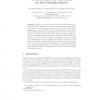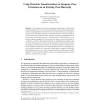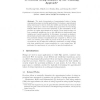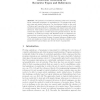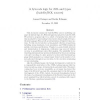65
Voted
APLAS
2006
ACM
15 years 6 months ago
2006
ACM
123
Voted
APLAS
2006
ACM
15 years 6 months ago
2006
ACM
Abstract. We propose a new join point model for aspect-oriented programming (AOP) languages. In most AOP languages including AspectJ, a join point is a time interval of an action i...
92
Voted
APLAS
2006
ACM
15 years 6 months ago
2006
ACM
Abstract. Class extensions provide a fine-grained mechanism to define incremental modifications to class-based systems when standard subclassing mechanisms are inappropriate. To...
APLAS
2006
ACM
15 years 6 months ago
2006
ACM
Abstract. The Scheme language report advocates language design as the composition of a small set of orthogonal constructs, instead of a large accumulation of features. In this pape...
104
Voted
APLAS
2006
ACM
15 years 6 months ago
2006
ACM
The static determination of approximated values of string expressions has many potential applications. For instance, approximated string values may be used to check the validity an...
96
Voted
APLAS
2006
ACM
15 years 6 months ago
2006
ACM
This paper tackles a problem often overlooked in functional programming community: that of testing. Fully automatic test tools like Quickcheck and G∀ST can test first order func...
112
Voted
APLAS
2006
ACM
15 years 6 months ago
2006
ACM
We present a local relational reasoning method for reasoning about contextual equivalence of expressions in a λ-calculus with recursive types and general references. Our developme...
106
Voted
APLAS
2006
ACM
15 years 6 months ago
2006
ACM
This document contains the Isabelle/HOL sources underlying our paper A bytecode logic for JML and types [2], updated to Isabelle 2008. We present a program logic for a subset of s...
APLAS
2006
ACM
15 years 6 months ago
2006
ACM
We give an elementary semantics to an effect system, tracking read and write effects by using relations over a standard extensional semantics for the original language. The seman...
108
click to vote
APLAS
2006
ACM
15 years 6 months ago
2006
ACM
straction for Imperative Languages William L. Harrison Dept. of Computer Science, University of Missouri, Columbia, Missouri, USA. ty in programming language semantics derives fro...

